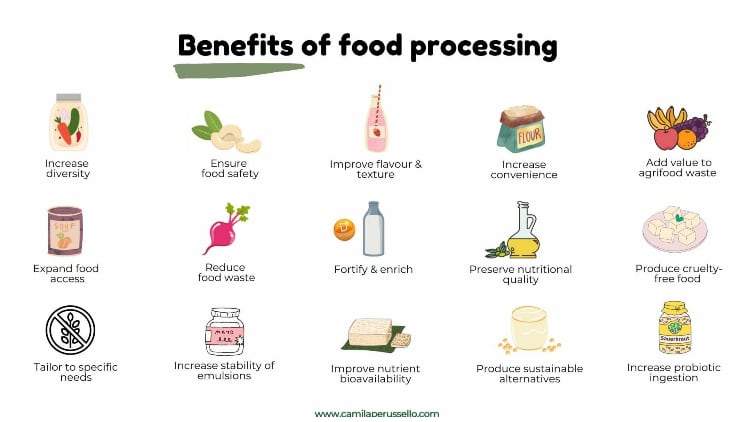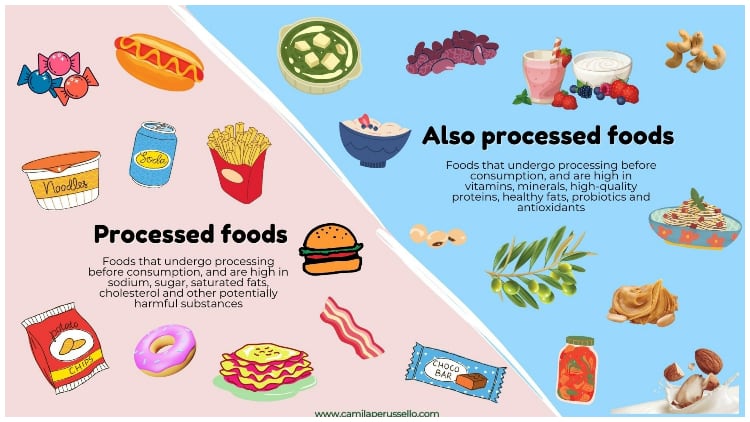Most consumers see food processing in a negative light, and the food industry is largely to blame. Let me explain.
Consumers tend to believe ‘natural’, unchanged, unprocessed foods are the healthiest and safest options. If you ask random people in the street how they define processed foods, most will mention things like ‘harmful chemical substances’, ‘low nutritional value’ and ‘genetic modification’. Although factually inaccurate, their view is understandable.
We all know that fresh, whole foods such as veggies and fruits are necessary for good health because they are packed with essential nutrients. But from that single piece of information, consumers conclude that anything that did not come directly from the farm to the supermarket shelf is processed and, therefore, unhealthy.
In fact, there is a concerning knowledge gap among laypeople as to what happens to food from field to fork. Whatever the underlying reason is, our educational system does not raise informed adults who understand where food comes from and how it affects humans, animals and the planet. While overly processed foods made of low-cost ingredients and offering poor nutrition (the so-called ultra-processed foods) should be avoided, well-designed processing methods are essential contributors to food security, diversity, safety and convenience. It begs the question – why isn’t food manufacturing taught at schools?
The natural food myth
Despite common belief, not everything considered ’natural‘ or unprocessed is healthy or, indeed, edible. And I am not referring to obvious things like poisonous mushrooms. Nutritious foods like cashew nuts and olives would not be part of our diet were it not for processing – ’raw‘ cashews are thermally treated to inactivate toxins, while olives are fermented to become edible. But the average consumer would never list cashew nuts, olives and other foods like yoghurt, porridge oats, dried pulses and wholegrain pasta as processed.
Fermentation, cooking, drying, extrusion, milling and extraction are all processing methods among dozens of others used in food manufacturing. It is not by accident that food process engineering is one of the most comprehensive engineering fields. Furthermore, contrary to popular belief, processed foods do not necessarily contain additives. And when they do, the additives undergo careful safety assessments before approval.
Processed foods and beverages like doughnuts, soda and ready-to-eat noodles cannot be compared to also processed (but healthy) items like dried tomatoes, tempeh and wholegrain rice. Yes, the nutritional value of food is affected by the processing stages and use of additives, but most importantly, the health impact depends on the raw ingredients. Unprocessed foods rich in saturated fats, cholesterol, sodium and sugar are not healthier than processed foods rich in saturated fats, cholesterol, sodium and sugar.
To sum up: most consumers do not have the slightest idea what processing means. So how can we expect them to understand that processing can be used for a range of great purposes?
Changing the narrative
Consumer education is vital for a just, sustainable and resilient food system where people eat healthily and consume mindfully, while farmers are valued for their work.
Are well-informed consumers what the agri-food sector really wants?
If the answer is ‘yes’, we are doing it wrong. We need more transparency, ethics and responsibility in the agri-food industry. We need to open our doors so people can see how food is produced with their own eyes. We must educate consumers based on robust scientific evidence so they can make the best of their food choices, for themselves and the whole planet.
The agriculture industry has frequently armed itself against external scrutiny. Take ag-gag laws, for example, state and federal laws that forbid or restrict recording at industrial animal farms and slaughterhouses. With so much secrecy, how can we blame consumers for ignoring what it takes for a slice of bacon to reach their table?
Ag-gag laws, food fraud, unsubstantiated health claims, skewed research funding, poor working conditions, animal abuse and environmental degradation have been eroding consumer confidence in the agri-food industry.
Health and diet
Decades ago, the sugar industry funded research that downplayed the health risks of sugar, pointing out fats as the single threat. It is now established that an excess of sugar, as well as saturated fats and cholesterol, pose serious health risks.
And the story repeats. According to the World Health Organization (WHO), cardiovascular disease (CVD) is the number one killer in the world. Globally, approximately 18 million deaths were attributed to CVD in 2019. Scientific studies show that diet is a leading driver of coronary heart disease and stroke. However, food industry-funded research has tried to cast doubt on decades of solid evidence on the link between dietary cholesterol and blood plasma cholesterol.
A review of over 150 studies on the relationship between egg consumption and blood cholesterol showed that industry funding soared from 0% in the 1950s to 60% in 2010-2019. The authors discuss how industry-funded studies tended to conclude that eggs do not raise cholesterol levels, even when the data indicated otherwise.
Cancer is another leading cause of death worldwide. In 2020, almost 10 million deaths were attributed to cancer, 20% being colorectal cancer. In 2015, the World Health Organization and the International Agency for Research on Cancer placed processed meat (e.g., ham, bacon and sausages) at the top of the list of carcinogenic substances, in Group 1 – ‘carcinogenic to humans’. The report showed that as little as 50 grams of bacon per day increased the risk of colorectal cancer by 18%. In addition, unprocessed red meat (like beef and pork that was not submitted to processes like curing and smoking) are listed in Group 2A – ‘probably carcinogenic to humans’. These are conclusions based on over 800 studies carried out across different countries and reviewed by a large panel of international experts. Since the report was published, there have been new studies supporting these conclusions. But the meat industry is fighting tooth and nail to question the truth of the mounting scientific evidence, even if using flawed, superficial logic.

What would consumers do if they had ample access to the evidence linking certain foods with cancer and other diseases – would this benefit or hinder the food industry?
In red meat, the factors responsible for the carcinogenic potential include meat consumption’s detrimental effects on the gut microbiota, as well as the compounds that form upon cooking, curing and smoking (e.g., N-nitroso-compounds, polycyclic aromatic hydrocarbons and heterocyclic aromatic amines – HCAs).
Again, processing does affect the health properties of foods and beverages – both positively and negatively. Environmental contaminants are also a factor. However, naturally occurring substances in the raw ingredients are largely responsible for their nutritional value and health risks. For example, HCAs are exclusive to animal flesh because creatine is needed to form it.
Often, I see food industry professionals criticising plant-based alternatives, calling them processed and pointing out the number of ingredients. As if animal products did not require processing! Moreover, the number of ingredients is not, whatsoever, a determinant of the nutritional value of a food.
Meat substitutes have been portrayed by some animal agriculture groups as inferior choices, despite the mounting peer-reviewed studies showing that swapping ‘real‘ meat with plant-based meat is beneficial. The replacement has been shown to reduce LDL cholesterol, trimethylamine-N-oxide (TMAO), insulin-like growth factor 1 (IGF-1) and other risk factors for CVD and cancer. Plant-based meat is surely not a tofu salad, but I’d argue it is way healthier than what it replaces.
By sowing confusion, the agri-food industry is shooting itself in the foot. But we can change this. To build a better food system, we need to produce healthy, sustainable, violence-free food and invest in unbiased consumer education. Let us expose the food manufacturing process, from farm to table, to combat misinformation. Let us show people the evidence so they can decide for themselves. There is nothing to hide – or is there? Industry must choose sides. For their own sake and everyone else’s.




